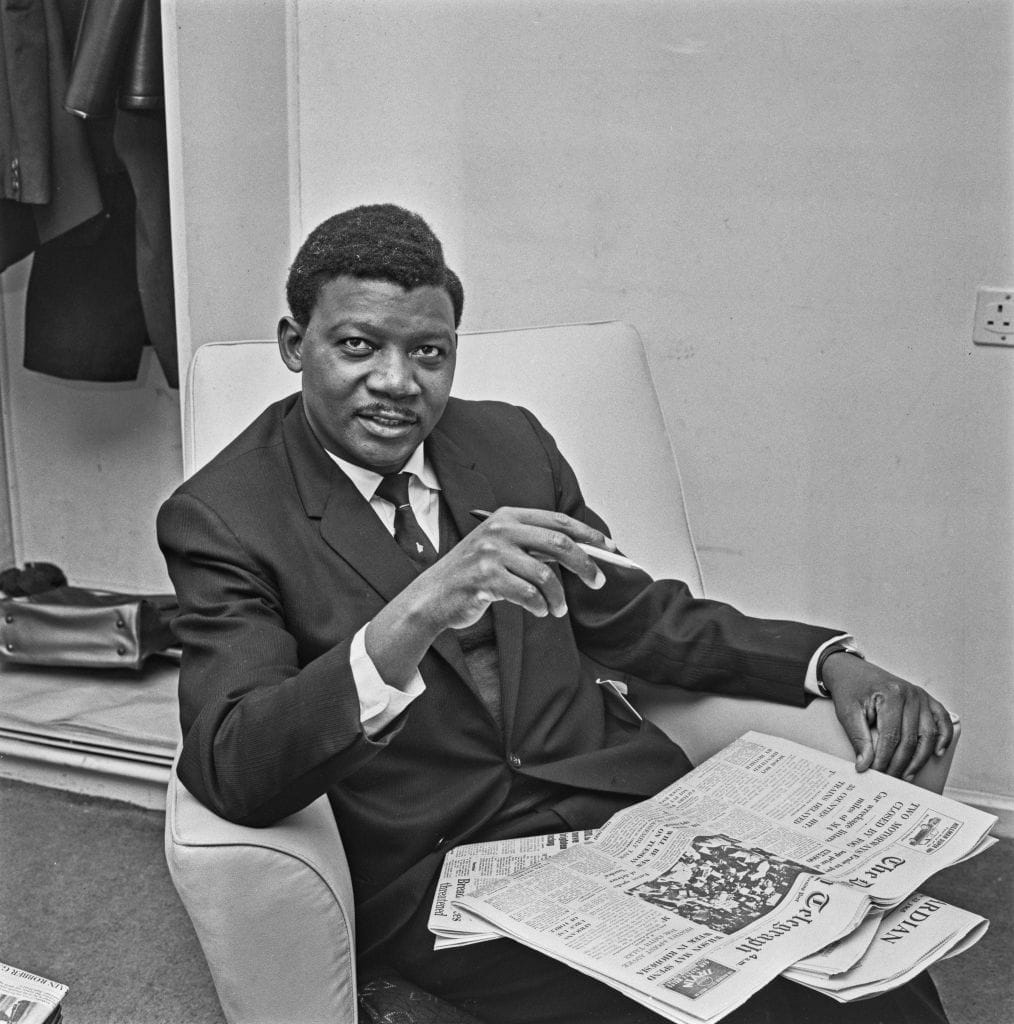Watch Herbert Chitepo’s speech recorded at the National Press Club of Australia in 1973 offers a unique perspective on the political situation in Southern Africa.
As the leader of the ZANU political party, Chitepo was well equipped to provide insight into the indigenous viewpoint of the ongoing confrontation.
His speech not only promotes an understanding of the conflict but sheds light on the indigenous struggle for freedom and self-determination.
As an informative piece, Chitepo’s address is an essential resource for anyone seeking a deeper understanding of the political climate in Southern Africa during the 1970s.
Who is Herbert Chitepo?
Herbert Wiltshire Hamandishe Chitepo was a prominent lawyer and politician who played a crucial role in the Zimbabwe African National Union liberation war movement in former Rhodesia.
Despite his importance in the movement, Chitepo’s life was cut short on 18 March 1975 when a bomb exploded in his car and killed him in Lusaka, Zambia. His death remains mysterious, with no conclusive evidence about who was behind the assassination.
While some point fingers at the Rhodesian government led by Ian Smith, others argue that there was infighting within ZANU at the time. Regardless of the cause, the death of Chitepo marked a significant loss for the liberation movement and Zimbabwe’s independence struggle.

Early Life
Herbert Chitepo was born into a humble peasant family in the Inyanga district of Rhodesia in 1923. Despite his challenges growing up in poverty, Chitepo excelled academically and became a leader in his field.
Chitepo’s educational journey began at St David’s Mission in Bonda, where he received his primary education. He later attended St Augustine’s Penhalonga for his secondary education.
In 1943, he travelled to South Africa to train as a primary school teacher at Adams College in Natal. After completing the program, he returned to Rhodesia to teach at St Augustine’s Penhalonga before returning to South Africa to further his studies at Fort Hare University. Chitepo’s academic prowess was evident when he graduated from Fort Hare University with a Bachelor of Arts in English.
He then went to London, where he worked as a research assistant at the School of Oriental and African Studies and later studied law at King’s College, becoming a barrister in 1954.
Legal Career
Herbert Chitepo was a trailblazer and a pioneering figure in the struggle for African liberation in Southern Rhodesia. With his education and legal training, he played a significant role in the fight for political freedom and paved the way for many others to follow in his footsteps.
His firsts were numerous: he was the first African in Southern Rhodesia to qualify as a Barrister-at-Law, the country’s second black lawyer, and he was appointed to the Board of Governors of Bernard Mizeki College concurrently with two white knights.
Throughout his career, Chitepo dedicated himself to defending African nationalists, taking on cases that sought to challenge and subvert the oppressive laws and systems the colonial regime had put in place. By representing high-profile figures like Ndabaningi Sithole, he established himself as a formidable legal mind and an unwavering defender of African rights.
However, he did not shy away from other forms of resistance and activism. Through his work with Joshua Nkomo and the Zimbabwe African Peoples Union, he played a crucial role in shaping the direction of the nationalist movement.
Despite his many achievements and accolades, Chitepo was not one to rest on his laurels, and he continued to pursue new challenges and opportunities for growth throughout his life. For example, his travels to the United States in 1960 aimed to connect with the African-American experience and build up his knowledge and network of contacts.
His dedication to education and intellectual curiosity were evident in his work as a research assistant at the School of Oriental and African Studies and in his later appointment to the Board of Governors of Bernard Mizeki College.
Political Career
Chitepo rose to prominence in the 1960s when the ZAPU party was banned for militant activity, and he was persuaded to go into voluntary exile to escape detention. He became Tanganyika’s first African Director of Public Prosecutions before eventually moving to Zambia to concentrate on the armed struggle.
As Chairman of ZANU, he was instrumental in planning and organising successful military guerilla attacks and other underground activities in Rhodesia from 1966 onwards. He also coordinated military operations with FRELIMO, which helped open Zimbabwe’s northeastern region as a new and effective war front.
A respected and influential leader within ZANU, Chitepo was trusted with significant responsibility and authority in the party. Rev. Sithole explicitly authorised him to carry out the armed struggle on behalf of ZANU. He worked closely with military supremo Josiah Tongogara in planning and executing guerrilla attacks against Rhodesian targets.
Despite facing significant challenges and obstacles during his political career, Chitepo remained committed to achieving independence for Zimbabwe. His peers and contemporaries highly respected him for his dedication, leadership skills, and strategic vision.
Assassination
Chitepo’s promising career was cut short on 18 March 1975 when he was killed in a car bomb explosion outside his home in Lusaka, Zambia. The bomb had been placed inside the front right wheel of his blue Volkswagen Beetle and was designed to detonate if the car moved.
Chitepo and two of his bodyguards were in the vehicle at the time of the explosion. Chitepo and one of his bodyguards, Silas Shamiso, were killed instantly. The other bodyguard, Sadat Kufa Mazuva, was injured but survived. A young Zambian boy nearby also sustained injuries and later died in hospital.
The circumstances surrounding Chitepo’s death have been the subject of much speculation and controversy. Several theories have been proposed to explain who was responsible for his assassination. One idea is that it was carried out by the Rhodesian Security Forces, who saw Chitepo as a threat to their regional interests.
Another theory is that it resulted from infighting within ZANU, as different factions vied for power and influence. Despite several official inquiries, no one has ever been formally charged or convicted for Chitepo’s death.








